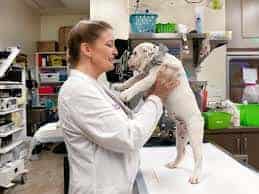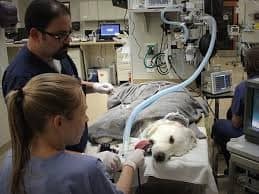
Selecting a veterinarian for your animal companion(s) can often be a difficult task. The following information will give you some useful guidelines when making this important choice for your pet’s medical care..
Learn about owning your companion cat or dog
The most important thing you can do is to educate yourself before you acquire a new companion animal and before you need a veterinarian.
Sources of information are varied and include the library, bookstores, pet associations or clubs, pet stores and reputable websites like VeterinaryPartner.com.
In general, aside from websites such as mentioned above, which has articles written by veterinarians specifically for pet owners, the Internet is not censored or edited in any fashion and therefore there is a great deal of incorrect, out-dated or altered information.
And believe it or not, Dr. Google is often wrong. In addition, be cautious about fully accepting information from people whose sole economic purpose is to encourage you to buy a pet or a specific pet product.
There can be human health risks to owning a pet. Some people are allergic to animals and it is important to check with your doctor about the feasibility of adding a certain species to your household. You can have allergy testing performed before acquiring a pet if you are unsure.
The other health risk is the spread of a specific disease from an animal to a human. The vast majority of transmissible diseases are preventable by practicing good hygiene, such as washing your hands after handling an animal and avoiding cleaning animal cages, bowls and litter trays in the same areas where human food is prepared. People suffering from HIV, hepatitis, some forms of cancer, undergoing chemotherapy or any other immune suppressant disease should be very cautious.
Once you pick out your pet

It is a good idea to have an initial post-purchase health checkup of your pet (best done within 48 hours of purchase) with your new veterinarian before you have a sick pet visit. This will give your veterinarian a chance to see if you indeed have a healthy pet and for you and your pet to establish a working relationship with your veterinarian.
- The Veterinarian you pick should provide the following:
- A clean facility
- Friendly staff
- Communicate clearly with you
- Be knowledgeable and willing to research or consult on something specific if he/she doesn’t know the answer immediately
- Have medications/vaccinations properly stored and that are not expired
- Provide detailed labels for medication prescribed
- Offer estimates for services if you request them
- Be able to see you animal companion within 1-5 days of calling for a routine appointment and 1-3 days for an issue
- Refer you to a 24/7 facility if an emergency arises that he/she cannot address right away
- He/she should be someone you are comfortable talking to and asking questions of
- Compassionate towards you and your pet
- Handles your pet with respect and care – minimizes stress
- Interested and knowledgeable about your species of pet
- Is a good listener
- Is willing to answer your questions
- Is interested in client education and encourages the educated client
- Is willing to accept/review information you may have collected on your own
- Is willing to admit when they don’t know the answer
- Is flexible with developing plans for treatment based on medical and financial constraints for each individual pet
- Is not offended when a second opinion is sought
- Encourages a “team” relationship between you and the veterinary staff for the care of your companion animal
- And so much more…
Always ask if you do not understand instructions or information given to you by a veterinarian or staff member. They cannot read your mind and they may think that the situation is adequately explained unless you tell them otherwise. It is your responsibility to make sure that you clearly understand instructions or information before you leave the veterinary office or hang up the phone.
Take the time to find a veterinarian before you need one. An emergency is not the ideal time to be looking frantically for help. Ideally you should find a veterinarian even before you acquire your companion animal. In addition, if you are looking for a specialist for your companion, be prepared to drive some distance for these services.
Finding Veterinarians
There are a variety of ways to find a veterinarian. A suggestion is to use several of these because you might be able to narrow your choice when the same name or names come up more than once. Sources include:
- Local and state veterinary associations
- Internet
- Local and national pet groups
- Neighborhood associations or websites
- Animal shelters
- Pet owners
- Pet breeders
The American Veterinary Medical Association (AVMA) can provide you with contact information for state and local veterinary associations and for various specialty groups and veterinary schools.
Questions to Ask
Once you narrow your choice to one or more veterinarians, it is time to ask some questions before you make your first appointment. Since this pre-visit interview might take more than a couple of minutes, it is helpful to tell the receptionist of the clinic that you would like to ask a number of questions that might be lengthy. In this way, the staff member can decide if they can take the call right away or if would be better if they called you back when there was a more relaxed time to speak. Another option is to fax or email your questions to the hospital ahead of time and then conduct a phone interview after the veterinarian and staff has had a chance to review them. This will save a lot of times at both ends. The veterinary staff can usually answer these questions and you may not need to speak to the veterinarian directly.
Here are some potential questions you might consider asking in a phone interview. Dr. X refers to the doctor or doctors in question and the pet refers to the specific species about which you are asking.
- How long has Dr. X been in practice?
- Does Dr. X have any specialty training?
- What veterinary or pet organizations does Dr. X or the hospital belong to?
- How do you handle after-hours emergencies? (You don’t want to find out during an emergency that the hospital you selected is unavailable after-hours or doesn’t have a place to refer you to)
- Does Dr. X refer difficult cases to anyone else? (There may be no one else, or Dr. X may actually be the referral clinic for the area.)
- Does Dr. X or the hospital work with any pet groups or shelters? (Not a requirement, but if they do work with these groups you have a source of opinion on this veterinary clinic.)
- Can you briefly meet with Dr. X prior to my first pet visit and/or have a quick tour of the hospital? (This is good idea if you still have any questions about your choice. Please respect the veterinarian’s time when scheduling these appointments and realize that this is to be a brief visit and be prepared with your questions.)
Visiting the Veterinary Hospital
Once you have made your selection you might want to visit the practice and make some observations. This could be on the pre-pet visit interview, or it might be on your first pet visit. There are a few things that you should observe to determine if this veterinarian is right for your pet.
- Cleanliness of the reception area, exam rooms and staff – If these areas/staff members are reasonably tidy, then it is more likely that attention is also paid to disease control and to clean medical and surgical habits.
- Ability and willingness of staff to answer your questions.
- Printed material available on your pet species as well as on services provided
- Skill with which the pet is handled.
Characteristics of the Veterinarian and Staff Members
You should be comfortable with your veterinarian’s personality. Fortunately, humans come with all different types of personalities from talkative and amusing to quiet and serious and all varieties in between! However, there are some common characteristics of a health professional that I feel are universally important (and this goes for human doctors too). These characteristics are also important in the veterinary staff members as well.
Owner Assistance with Restraint – Some Thoughts
Often caregivers will want to know if they can restrain their companion animal during a variety of procedures. Although this may be comforting to their companion, the veterinarian unfortunately has to consider some serious legal implications.
By law, injuries that occur in the veterinary hospital are the responsibility of the hospital or individual veterinarian. One of the most common law suit situations seen every year is when caregivers / pet owners sue veterinarians for medical damages after they are injured by their own animals during procedures where they were helping the veterinarian.
Veterinarians are advised by their malpractice insurance providers not to allow owners to assist in any procedures in the hospital. In addition, some animals become more frightened and difficult to handle if they are restrained improperly by a nervous owner rather then by an experienced, calm assistant. Have a conversation with your veterinarian about how you handle your pet normally, giving ideas on how to minimize stress, and then work as a team to complete the task. If you remain, calm, helpful and supportive of both your companion and the staff, it will minimize stress all around.
Sometimes there can be disadvantages of being with your pet during an unpleasant procedure. Sometimes animals associate the caregiver with the unpleasantness and it may then be difficult to reestablish a good relationship afterwards. Sometimes it is better to have the veterinary staff be the ‘bad guys” and then when the pet is returned to you, you are the “rescuer”!
Ultimately it will be the result of the relationship you establish with your veterinarian that will determine how involved you can be during treatments and diagnostics at a veterinary clinic. If you develop a trusted team relationship, you may be allowed to assist in a wide variety of procedures. However, at all times, please defer to your veterinarian’s judgment on when and where you can help. He or she is ultimately responsible for your companion animal’s well being and also to protect you from physical harm.
The Final Decision
Carefully consider the information you have gathered along with your direct experience to choose your primary care veterinarian. Sometimes it may be necessary to use a less experienced veterinarian simply because there are no other choices in a reasonable travel area. Pick one with enthusiasm for learning and develop your education as a team. Never be afraid to seek a second opinion if you are in doubt.
Your Responsibility
As a caregiver you have certain responsibilities to your pet and the veterinary staff. If you follow through with the suggestions listed below you will create a strong and effective team.
- Be educated – This is a continuous process throughout your pet’s life
- Be prepared – Have your questions written down/ bring a notebook to record answers
- Ask questions – If you don’t understand something ASK!!! Veterinarians and their staff are not mind readers and they appreciate knowing when you don’t understand something so information can be accurate.
- Report problems promptly, respectfully and to the proper person – If you have a problem with a veterinary practice, please do them a favor by letting the practice manager or practice owner know about it right away. Often the problem is simply a miscommunication and can be cleared up immediately, making it unnecessary for you drive away angry to another hospital. Most veterinarians want to know about problems so they can be addressed. Be prepared to discuss the problem openly and as calmly as you can so that a reasonable solution can be reached.
Developing a team relationship with the veterinarian and veterinary staff of your choosing will provide the effective support you and your companion animal will need in when medical situations arise.


